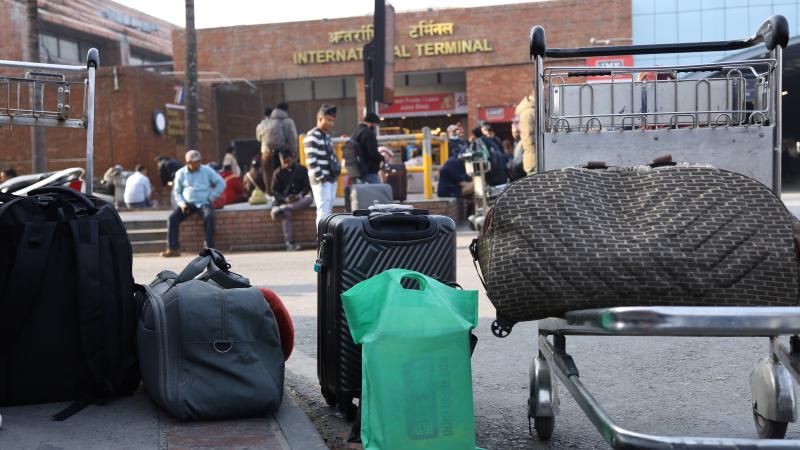Embattled Belarus president Lukashenko may not have support he claims from Putin
Media reports to the contrary, Moscow has offered only tepid support for the regime in Minsk, experts say.
As protests rock Belarus in the wake of a disputed election, reports have emerged that Vladimir Putin has offered to help strongman Alexander Lukashenko retain an increasingly tenuous hold on power. But those reports likely are untrue, experts said, and may be a last ditch effort from a desperate Lukashenko -- dubbed "Europe's last dictator" -- from being tossed from the office he has held for more than a quarter-century.
According to some accounts, Moscow offered to put down the ongoing Minsk protests by force; or, in other readings, to repel outside incursions into Belarus that seem unlikely to happen.
The protests are in response to what widely has been decried as a rigged presidential election. The demonstrators want a new, "free and fair" vote.
In rallies that have drawn hundreds of thousands into the streets, protesters reportedly have been beaten, arrested, and tortured. But Lukashenko, who took power in 1994, claims that he is the one who is threatened and needs help.
Media in Belarus reported that a Sunday phone conversation between Putin and Lukashenko centered on security concerns.
“The leaders reaffirmed their agreement that if the situation aggravates due to the external threats the parties will provide a joint response in line with the provisions envisaged in the Collective Security Treaty,” read an Aug. 16 article in the state-run BelTA News. To some, this translated as a pledge for military assistance.
The truth, one observer noted, more likely is that Putin is at best a tepid ally to the Belarusian regime.
Putin’s affirmation of support for Lukashenko, made during two weekend phone calls with the embattled ruler, “smacks of reluctance,” author Anna Arutunyon wrote on Sunday in the Moscow Times.
“Initially, words to the effect that Moscow would provide security came from Lukashenko, not from the Kremlin, whose initial statement, however conciliatory, mentioned nothing of aid or support," Arutunyon wrote.
The Russian Federation, for its part, was careful to note that Lukashenko called Putin - not the other way around.
“On the initiative of the Belarusian side, Vladimir Putin had a telephone conversation with President of the Republic of Belarus Alexander Lukashenko,” the Kremlin announced Saturday.
The announcement focused not on validating Lukashenko’s widely disputed victory at the polls, but mentioned the thorny issue of Russian citizens arrested recently in Belarus.
“In connection with the return to Russia of 32 citizens previously detained in Belarus to Russia the day before, a positive assessment was given to the close cooperation of the relevant departments on this issue,” the statement read.
The comment references the arrest last month of Russian mercenaries accused of infiltrating Belarus in order to create chaos.
“It is a dangerous business, offering security and support to a regime that has repeatedly accused you of violating its sovereignty,” Arutunyon wrote.
Allied since the Soviet Union dissolved in 1991, Belarus and Russia in 1999 signed a “union state” treaty to enhance economic ties between their two countries. Since then, Lukashenko has wavered over forging closer ties.
“The Russian leadership is demanding that we join the Russian Federation — that's what is in the heads of the Russian leadership,” Lukashenko said in 2007. “I don't want to bury the sovereignty and independence of the country.”
The treaty drew scant international attention, though, until 2014, when Russia seized Crimea, and it seemed plausible that Russia would expand westward to encompass Belarus.
“That is when the two so-called friends got less friendly,” a Lithuanian Land Forces officer told Just the News earlier this year.
As 2020 elections drew near, Lukashenko voiced suspicions not just about Russia, but also other suspected predator-nations.
“A hybrid war is going on against Belarus and we should expect dirty tricks from any side, which we actually do,” Lukanshenko said in an Aug. 6 meeting with officials to discuss election day security.
Provocateurs from NATO and the United States were creating problems, and Russia was defending them, Lukashenko reportedly charged.
Election problems stem, though, from the regime in Minsk, the international community has said.
“The United States is deeply concerned about the conduct of the August 9 presidential election in Belarus, which was not free and fair,” U.S. Secretary of State Mike Pompeo said in a statement. “Severe restrictions on ballot access for candidates, prohibition of local independent observers at polling stations, intimidation tactics employed against opposition candidates, and the detentions of peaceful protesters and journalists marred the process.”
Additionally, he denounced how the Belarus government handled the aftermath.
“We strongly condemn ongoing violence against protesters and the detention of opposition supporters, as well as the use of internet shutdowns to hinder the ability of the Belarusian people to share information about the election and the demonstrations,” Pompeo said.
On Sunday, a defiant Lukashenko spoke to supporters.
“NATO troops are at our gates,” Lukashenko reportedly warned. “Lithuania, Latvia, Poland and our native Ukraine are ordering us to hold new elections. I have never betrayed you and will never do so.”
Protesters were undeterred. The anti-Lukashenko faction has called for a nationwide strike to commence Aug. 17. The strike reportedly will continue "until the requirements of the people are met."
The Russian Foreign Ministry and officials in Belarus did not immediately return emails from Just the News asking for comment.















